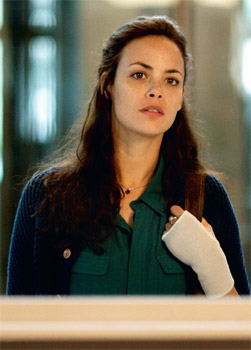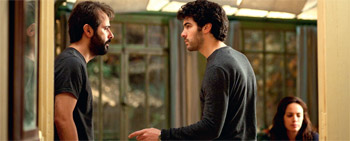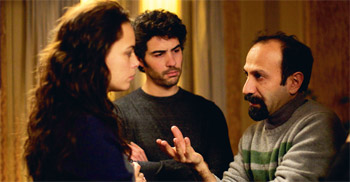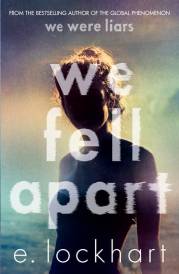Berenice Bejo The Past Interview

Bérénice Bejo The Past Interview
Cast: Bérénice Bejo, Tahar Rahim, Ali Mosaffa, Pauline Burlet, Elyes Aguis, Jeanne Jestin, Sabrina Ouazani, Babak Karimi, Valeria Cavalli
Director: Asghar Farhadi
Genre: Drama, Mystery
Rated: PG
Running Time: 130 minutes
Synopsis: Following a four year separation, Ahmad returns to Paris from Tehran, upon his French wife Marie's request, in order to finalise their divorce procedure. During his brief stay, Ahmad discovers the conflicting nature of Marie's relationship with her daughter Lucie. Ahmad's efforts to improve this relationship soon unveil a secret from their past.
The Past
Release Date: February 6th, 2014
Interview with Bérénice Bejo
Question: What was your first impression when you read the script of The Past?
Bérénice Bejo: I had to wait a month before I received it. I'd met Asghar, then I went abroad on vacation and I waited to find out if he was going to give me the script, and if he was going to offer me the role or not. When I finally got hold of it, I picked it up like a jewel, a rare object that I was lucky to have in my hands. I found everything in it that I liked in his previous films. A mood, characters who aren't just monochrome, and who always retain a degree of mystery, and a complex story which continually makes the spectator change his or her mind. I finished reading it enchanted.
Question: How did your first meeting go?
Bérénice Bejo: We met two hours before I took a flight, and I've never done a test like that! Asghar was looking for something in my face, I didn't know what. Then he put some cotton wool in my mouth, he darkened by forehead, he worked on the corners of my mouth. To the point where I said to the make-up artist: "If he wants to change my face that much, he might as well find someone else." We hardly spoke on the day of the tests. Just a little about the character. And when I left, I knew next to nothing.
Question: When he spoke about the character, what did he say?
Bérénice Bejo: "She's a woman with two children, who is in love with a man who has a child, and who has to get divorced from another man." He asked me if I had any children. I told him I have two, and that my partner also has two. So I'm mother to four children, every other week. It was a way of telling him: "I can relate to what you are telling me, and perhaps I can find an echo of it in my life so that it works on screen."
 Question: Asghar Farhadi is very keen on organising rehearsals before his shoots. How long did they last?
Question: Asghar Farhadi is very keen on organising rehearsals before his shoots. How long did they last?
Bérénice Bejo: Two months. We met up three or four times a week, sometimes also on a Saturday, and we rehearsed for four to five hours. It's something I'd never done before, and must be close to the preparation for a stage actor, working as a troupe. Asghar had us do exercises for half-an-hour; we walked round the room, we ran, we relaxed, we did sit-ups. And he always demonstrated the exercises to us, clearly taking the role of troupe leader. After that, we read the script, and sometimes we improvised a little around it. And we always all did the same, even when the scene didn't involve us. By the end, I was growing more and more impatient. I wanted to get on with filming, especially since Asghar's demands were becoming increasingly precise.
Question: Did this precision scare you ahead of the shoot?
Bérénice Bejo: I was mainly afraid of growing tired of the text and the story. And once we started shooting, I felt I'd already done the film! In movies, the first montage that the editor puts together right after the shoot is called the "rough cut". I felt as if I had done this rough cut myself! When you're an actor, you sometimes worry about lacking in spontaneity, but I discovered that it is through working that one becomes more spontaneous. You know the character so well that things escape from you.
Question: So in the end, how did the shoot go?
Bérénice Bejo: Asghar made it easy. I was never struggling, I always played Marie quite naturally because I knew her by heart. I'm not saying there were no moments of doubt, times when we redid takes, when we were all groping around for something, but I experienced all the incidents in her life from the inside. Sometimes in the evening, I'd say: "I don't understand. I feel as if it all came so naturally." That was exactly what Asghar was after: for me never to intellectualise the character, for me to always live it from the inside.
Question: Are you at all like Marie?
Bérénice Bejo: Not at all. That's an interesting point: I was shooting scenes in which Asghar asked one thing or another from me, and I would think: "That's so not me!" At no time would I have reacted the way Marie reacts. What a delight for an actor to play a character so easily who is the complete opposite of themselves.
Question: What did you know about Marie at the start of rehearsals? Had you constructed a back-story for her character?
Bérénice Bejo: I knew she was a pharmacist in Paris, whilst living on the outskirts. It's not really very clear, but I imagined she was a simple employee at the pharmacy. During rehearsals, we thought about her relationship with Ahmad, how they had met, and also who was her first husband with whom she had two children. And also why Ahmad and Marie split up. We even acted out some break-up scenes. We imagined that they separated via Skype. Ahmad left, saying he'd be back, but he never did come back. It was important for me to act out those scenes: it forged something between Ali, who plays Ahmad, and me. I could look him in the eyes, laugh with him, cry – he was part of my everyday life. We also constructed the past of the character played by Tahar. For example, we did quite an interesting exercise in which Asghar asked us, facing the camera, to say who Samir's wife was. I described her physically. Then Tahar did the same thing. And gradually a picture of this woman emerged...
Question: The script stipulates that there was a complicated episode, that Ahmad was depressive for a long time. Did you discuss this period and imagine these moments?
Bérénice Bejo: No. Asghar often talks about immigrants. He often says that Iranian culture is very different to ours, and that often those Iranians who come to France cannot adapt to our lifestyle. They get depressed and return home. I think Ahmad's character is a little like that. He's someone who tries to integrate into a new society, into a new life, and who genuinely falls in love. But at some point, it's too much for him and he'd rather go home. Marie has understood what happened to Ahmad. If she's angry with him, it's because he didn't have the courage to tell her to her face. You can tell in his films that Asghar believes in women more than in men; that he finds women stronger and more expressive.
 Question: The story is universal, but does it say anything about today's France?
Question: The story is universal, but does it say anything about today's France?
Bérénice Bejo: No, not particularly. It has something to say about today's world. About the complicated relationships between human beings, about the situations in which they may find themselves, which are sometimes completely absurd. In fact, Asghar likes posing questions, putting people in certain situations, but don't count on him to supply any answers or solutions. That's what works in his filmmaking.
Question: Your character in some ways serves the role of provoking emotions, while the masculine characters are more evasive, or cowardly.
Bérénice Bejo: It's true, Marie is always at the heart of the action. She's the one who asks the difficult questions, and who is waiting for the answers. But as an actress, I didn't really feel that, because Asghar's way of shooting is very particular, very meticulous. The shoot was very long. Sometimes we did five shots a day, when on another film, you might do 15. Everything is at once diluted and very precise.
Question: How do you grasp the character when you work fragment by fragment?
Bérénice Bejo: That's what the rehearsals were for. Then there's the total confidence I have in Asghar. He can be really very, very precise. Certain scenes are put together like a ballet. For example, he would say: "Now Bérénice, you do this, you go there, at this point you speak, you move in that direction. And you, Tahar, once she speaks, you move this way." And he would perform all my movements, then those of Tahar, then say our dialogue but without acting. To begin with, this can be quite unsettling. You wonder how you can put your own stamp on it. But in fact, it doesn't always happen as he demonstrated it; he just indicates a path. It's his way of helping us, of saying: "Here, I'll give you a pathway so that you feel loved, aided, watched over, but from then on, do what you like." And I love that. He's a manipulator, but with no perversity.
Question:Asghar Farhadi doesn't speak French. What did that change on set?
The Past
Release Date: February 6th, 2014
MORE





